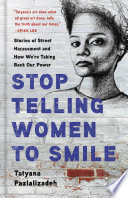
Stop Telling Women to Smile
Stories of Street Harassment and How We're Taking Back Our Power
کتاب های مرتبط
- اطلاعات
- نقد و بررسی
- دیدگاه کاربران
نقد و بررسی

December 15, 2019
Anger fuels an artist's project to publicize the prevalence of street harassment. Painter and street artist Fazlalizadeh makes a compelling book debut that expands her public art series "Stop Telling Women to Smile." The series began when she mounted three posters she drew of women's faces--her own and two friends'--each captioned with a single sentence in protest of street harassment: "My Name is Not Baby, Sweetie, Sweetheart, Shorty, Sexy, Honey, Pretty, Boo, Ma" and "Women Are Not Seeking Your Validation." As the posters gained attention, the project grew into interviews with--and portraits of--many women who talked about their experiences with vulnerability, fear, and mental, emotional, and physical exhaustion. "Street harassment," writes the author, "is not an isolated issue" but rather part of "a long history of aggressive sexualization" that includes domestic abuse and sexual assault. Fazlalizadeh cites research showing that between 40% and 60% of women attest to having experienced street harassment in the Middle East and North Africa; 65% in the U.S.; 79% in India; 86% in Thailand and Brazil. She cautions against viewing men's comments as evidence of sexual attraction; harassment, she writes, "is ultimately about power and dominance." Most of the 10 women portrayed in this book recall being harassed even as children, often by adult men. "It's always shocking how young we were," one Asian American woman reveals. "When I was young," a queer, gender-nonconforming Latinx reveals, harassment felt like "the cornering of a younger body into a very sexualized being." Asian women and women of color often encounter stereotyped sexualization. "Not Your Asian Fetish, China Doll, Geisha," one woman's poster reads. Several interviewees identify as queer and one as trans, presenting an image that seems to threaten some men. "For a couple composed of two women," street harassment "will likely be layered with homophobia." By capturing women's rage and frustration, Fazlalizadeh hopes to create empathy, "ignite actions and engage communities of people." A graphic and often moving contribution to the important conversation about endemic sexism.
COPYRIGHT(2019) Kirkus Reviews, ALL RIGHTS RESERVED.

March 13, 2020
In 2012, portrait artist Fazlalizadeh created a street art series of posters in Brooklyn called "Stop Telling Women To Smile," depicting drawings of women responding to street harassment. Fazlalizadeh centered her work on the experiences of women of color, who, she explains, are often left out of the conversation of harassment in mainstream media. Powerful and effective, the project quickly grew, as people shared images of the artworks on social media and journalists began covering the story. Part 1 of this book profiles the women depicted in Fazlalizadeh's art. Part 2 delves into the reasons she decided to turn her art into activism, featuring a clear message to men about the crucial role they play in addressing this ingrained and pervasive problem. Fazlalizadeh concludes with a hopeful vision of a better future; her affecting and empowering artwork appearing throughout. VERDICT An important addition to women's studies, art history, and political collections that will also be valuable in more general public library holdings.--Venessa Hughes, Denver
Copyright 2020 Library Journal, LLC Used with permission.

February 1, 2020
Fazlalizadeh is a classically trained oil painter whose street art series on harassment has cemented her legacy. In this debut, she tackles the humiliation of street harassment from cisgender men with her own experiences, as well as the stories of nine other women from diverse backgrounds. Fazlalizadeh provides a voice for these women by detailing their experiences and how those experiences made them feel. She also creates a black-and-white portrait for each with a message from the women to their attackers. The writing is precise and leaves little room for misinterpretation. Readers who haven't been directly affected by street harassment will find precise instructions on how to be an ally. As the book tackles heavy topics such as the politics of women's bodies and violence caused by sexism, Fazlalizadeh also shares her self-care techniques and ways she copes with it all. Every reader can walk away from this book more conscious of ensuring women are safe to move through public as well as private spaces.(Reprinted with permission of Booklist, copyright 2020, American Library Association.)

























دیدگاه کاربران